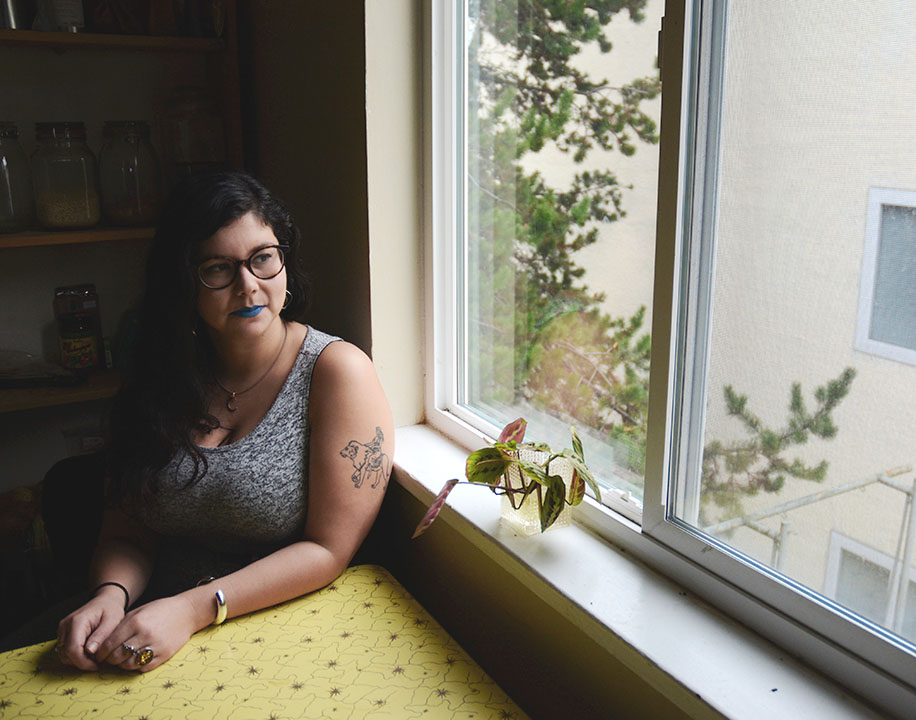On my way to meet Adèle Barclay, she texts me to say she’s running late. I don’t think much about her message, too distracted by the news that a beloved Canadian poet has just died, and the ongoing political climate in America. So distracted, in fact, that I don’t consider that perhaps Adèle has been affected by the same things.
“That’s why I asked if we could meet later!” Adèle proclaims when I bring up the poet. “I just found out, and I was like, ‘I have to go listen to some Leonard Cohen music, I’m not ready to leave the house!’”
As a poet, it’s understandable that Adèle would be so impacted by the loss of someone so adept at using words to convey the complexities of human experience and relationships. In many ways, Adèle’s incredible new poetry book If I Were In A Cage I’d Reach Out For You communicates similar ideas about human connection, and the messiness of all types of love.
“I was in New York on a research trip for my Ph.D, and I took a poetry workshop with the poet Brenda Shaughnessy. It was life changing,” says Barclay when I ask her about the book’s beginnings. “I had a handful of poems, but I was feeling out of step, and my Ph.D took over. I wanted to write a book but I didn’t really know if it would happen or if I could, and then I took this workshop, and [Brenda] really believed in my writing. It jolted me.”
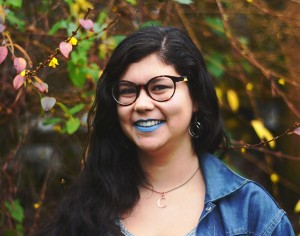
In addition to spending time in New York, Adèle has also lived in Montreal, Victoria, Vancouver, and has spent a great amount of time moving from place to place. And while moving can be physically and emotionally grueling, Adèle has found ways to channel it into her writing.
When I ask how she feels her location influences her work, Adèle says, “I think the book is really obsessed with place, and how humans are tethered not only to each other, but to their surroundings.” She continues, “I’m interested and sensitive to how space shapes our relationships to each other. The poems [in the book] are to people, but they are also to people in specific places, or people in different places, and trying to build that metaphorical bridge, despite distance.”
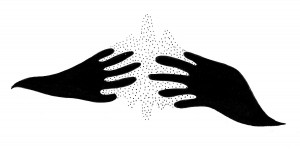
The connections that Adèle has to those in her life is a compelling theme within her book, displayed most prominently by a collection of six poems titled ‘Dear Sara’ which Adèle refers to as a sort of ‘spine’ of the collection. These poems invoking an incredibly intimate space, giving readers a glimpse into Adèle’s world.
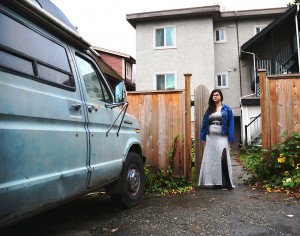
“I like the direct address to a person,” she says, when I ask her about the personal poems. “A lot of my work is informed by people and relationships, and so much of that is language. You have this very specific world with people, out of language, it’s very rich and lush and idiosyncratic. These poems are like letters but they’re also odes to that world I’ve built with someone, and the language and vocabulary and texture of that relationship. There’s something about writing poetry that allows me to get at the things about a relationship that I can’t really express in prose. Things that are more irresolvable. I think poetry can hold those weird paradoxical strings, things that don’t fit the normative scripts.”
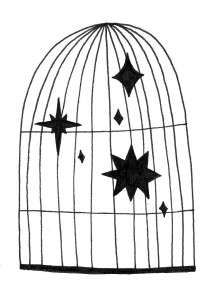
I ask Adèle if it was strange or scary to include these seemingly intimate poems, and she laughs.
“It was definitely weird, I was a little anxious. I thought [the Sara poems] were these weird things I was writing for my friend, but people responded really strongly to them, so I was like ‘Okay well, I guess they like our love.’”
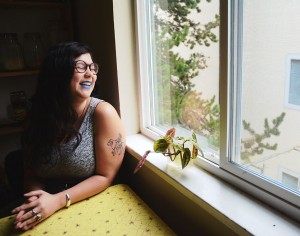
Discussing this public display of affection, I’m reminded of the ways people show affection for one another over social media. I find my own impulsive reaction to this is often negative, wondering why people feel the need for a public, rather than private declaration. Talking with Adèle, I question this reaction.
“Seeing models of love and behaviour that are good is not a bad thing,” she says. “Just because [the poems] are a performance of emotional vulnerability doesn’t degrade that emotional vulnerability. I think the poems also don’t gloss over the bad, or the messier bits, and that is something that I’m always thinking about. How do you also show the messy, and the low moments, or perform vulnerability? How do you perform the range of emotions and not just the good stuff?”
These are tough questions, and given the current state of the world, it’s tempting to want to hide from them. How do we focus on the messier, darker things, without getting lost within them, without losing hope? For Adèle, the answer is in poetry, and considering how it can be taken up as a political act.
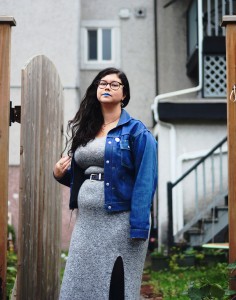
“I think of poetry as incredibly magical. There is logic to it, but there is something irrational to it. I see it as a counter spell to neoliberalism, [which is] kind of what got us into this mess; this neoliberal, patriarchal, white supremacist, mess. [There are] these systems that want to quantify and own everyone and everything. Poetry isn’t interested in that. Poetry resists, it’s outside of that scope, because it’s not super profitable. It doesn’t try to resolve things, it’s something that is at home with messiness and paradoxes … In this fraught, capitalist society, relishing in interpersonal relationships, celebrating non-normative relationships and scripts, I think that is political. I think of it as radical kinship or radical kindness. Saying those things out loud as well, being public about emotional vulnerability, I think can be political, right? Or at least I hope so.”
I hope so, too.
x
If I Were In A Cage I’d Reach Out For You is out now on Nightwood Editions. You can purchase a copy at nightwoodeditions.com, or at your local bookstore.


